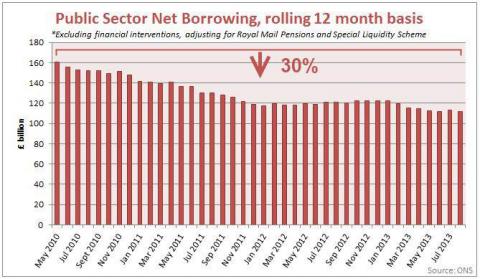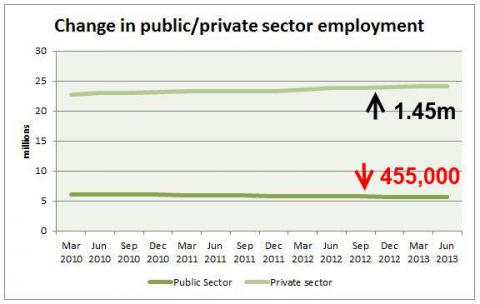Conservative conference 2013: exports, jobs and the deficit
"The deficit down by a third, exports doubled to China... 1.4 million new jobs created by businesses... Our plan is working." George Osborne, 30 September 2013
After announcing earlier in the summer that the British economy had "turned a corner", Chancellor George Osborne was again upbeat about the UK's economic prospects at his party's annual conference in Manchester, telling delegates that "the sun has started to rise above the hill."
Among the achievements Mr Osborne pointed to in support of his optimism was a falling government deficit, booming trade with China and over a million private sector jobs. Are the figures as rosy as the Chancellor seems to think?
Join 72,953 people who trust us to check the facts
Sign up to get weekly updates on politics, immigration, health and more.
Subscribe to weekly email newsletters from Full Fact for updates on politics, immigration, health and more. Our fact checks are free to read but not to produce, so you will also get occasional emails about fundraising and other ways you can help. You can unsubscribe at any time. For more information about how we use your data see our Privacy Policy.
The deficit is down by a third
As we've seen previously, there is more than one way that the deficit can be measured, but the most commonly-used is public sector net borrowing (PSNB), which forms part of the ONS's Public Sector Finances release.
Looking at borrowing (and adjusting for one-off transfers such as the Royal Mail Pensions scheme and the Bank of England's Asset Purchase Facility, which can skew the data) we can see that the deficit has fallen by 30% - just shy of a third - since May 2010.

When we last looked at a similar claim, the fall was less impressive if we looked at the data in terms of the 'current budget' deficit (put simply, the difference between government receipts and expenditure, which doesn't reflect changes in investment spending, among other things).
However a combination of revisions to previous estimates and a significant narrowing in the gap between government spending and income in the past year means that this measure now shows a more impressive decline than PSNB, clocking in at a reduction of nearly 37%.
Whichever way we look at the data therefore, the Chancellor's claim that the deficit has been slashed by a third seems a reasonable approximation.
Exports doubled to China
The second claim made by the Chancellor in defence of his management of the economy is that under his watch, UK exports to China have doubled.
This claim is slightly more difficult to pin down. The ONS publishes quarterly trade figures by country, and these show that since the second quarter of 2010 (the closest approximation we can get for the election), the value of British exports has grown by 77%: not quite a doubling.
However this doesn't necessarily mean that the Chancellor is wrong. The ONS's data only covers the goods export market, and doesn't factor in the value of services which have been sold to Chinese companies. As the Foreign Office has noted, in 2011 the services market made up over a quarter of all exports, and if it has continued to grow since, it is conceivable that this added value might bring the figures more in line with the 'doubling' perceived by the Chancellor. We've asked the Treasury for more up-to-date information, and will update if we receive any.
The growth in the value of the Chinese export market to UK firms has been growing for many years, regardless of which government has been in office (the Foreign Office points out that it quadrupled in the nine years between 2002 and 2011).
In fact, the average quarter-on-quarter growth in the goods export market in China under the Coalition is just shy of 6%, compared to nearly 15% in the previous 49 quarters of the Labour government. Again however we should treat such comparisons with caution: the figures will to a large degree depend upon the economic health of both countries, and both have been volatile in recent years.
So while there certainly is a strong trend in growth in the Chinese export market for UK businesses, exactly how large it is and how much credit is due to the Chancellor is a matter for some debate.
1.4 million private sector jobs
This claim is another that is frequently aired by Coalition ministers, and one that we have checked before (albeit with older data).
Public and private sector employment figures are again published by the ONS, and we can trace the Chancellor's claim directly back to these.
If we take the last full quarter of the previous government as the baseline, private sector employment has indeed jumped by over 1.4 million, while public sector employment has fallen by 455,000.

While these figures avoid the problems we've seen in the past caused by the transfer of jobs in Further Education colleges from the public to the private sector by removing these from the equation, they aren't without controversy.
Firstly, the last election fell almost exactly in the middle of Q2 2010, which means it's impossible to get a full picture of how employment has changed under the Coalition. As it happens, Q2 2010 also saw a large increase in private sector employment, and the Chancellor in making this claim is essentially claiming credit for this 294,000 jump, when nearly half of the quarter fell within the last days of the Labour Government. If you compare only the period that falls solely under the Coalition's watch, the rise in private sector employment is a slightly-less-impressive 1.16 million (again, excluding the transfer of FE college jobs).
Secondly, these figures don't strictly refer to 'jobs' but rather the number of people in employment. Because some people may have more than one job, and some jobs may be part-time or zero hours jobs, the two aren't necessarily the same thing as the ONS has previously pointed out.